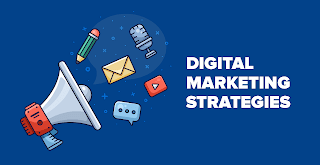Are you looking to learn more about digital marketing? Are you curious about the process but don’t know where to start? Look no further! In this blog post, we will outline the basics of digital marketing and provide you with a free course that can help you get started. Whether you are a business owner, marketer, or just someone who wants to stay ahead of the curve, this course is for you. By the end of it, you will have the skills and knowledge required to take your digital marketing to the next level. So what are you waiting for? Register today and join the thousands of people who have benefited from this course.
What is Blogging?
Blogging is the act of writing and publishing a blog. A blog is a type of website where people can post articles about anything they want. It’s a great way to get your message out there, and it can be an effective way to promote your business.
To start blogging, you first need to create a blogspot account. Once you have an account, you can set up your blog using the provided tools. You can choose to host your blog on Blogspot’s servers or use a third-party provider like WP Engine.
Once your blog is set up, it’s time to write some content! The best way to start is by thinking about what topics you want to cover. Once you have a idea for a post, start drafting it using one of the many tools available on Blogspot. Once you have finished drafting the post, go ahead and publish it!
blogging can be an effective way to promote your business
The Different Types of Blogging
There are a few different types of blogging, each with its own benefits.
1. Newsblogging: A newsblog is a type of blog that focuses on reporting the latest news stories, rather than promoting your own opinions or insights. This type of blog is well-suited for sites that have a lot of incoming traffic and want to provide their readers with the latest updates on happenings across the globe.
2. Opinion Blogging: An opinion blog is a type of blog where you write about your own personal opinions on topics that interest you. This type of blog is great for gaining an audience of people who share your interests, as well as building relationships with other bloggers who may be interested in writing about similar topics.
3. Product Blogging: A product blogging site is designed to help you sell products online. In most cases, it incorporates features such as product reviews, how-to articles, and shopping tips to help you promote and sell your products.
4. Service Blogging: A service blogging site is designed to help businesses offer their customers more comprehensive services than they could ever offer on their own. It often includes features such as customer testimonials, FAQs, and pricing charts to make it easy for customers to find information they need and compare prices between providers.
The Benefits of Blogging
There are numerous benefits of blogging, including:
1. Increased Exposure: By writing regularly about your thoughts and experiences, you will generate increased exposure for your site and potentially attract new visitors. This can be valuable both in terms of SEO (search engine optimization) and in terms of generating leads and building brand awareness.
2. Improved Branding: Blogging can help to build a strong brand for your business, as it can emphasize the unique qualities that you offer. This can be effective in attracting new customers and increasing sales.
3. Increased Engagement with Your Readers: If you blog regularly, you will likely develop a loyal following of readers who appreciate your insights and perspectives. This can lead to increased engagement with your content – especially if you make use of social media platforms to connect with your readers – which can result in boosted web traffic and increased impressions on search engines.
4. Enhanced Communication Skills: As a blogger, you will learn to develop compelling content that resonates with your audience. This should prove useful not only when it comes to generating web traffic but also when it comes to building relationships with potential clients or partners.
How to Start a Blog
If you’re new to the world of blogging, there are a few things you need to know before starting your own blog.
1. Choosing a Blog Name
Your blog name is one of the most important decisions you’ll make when starting your blog. It should be something that accurately represents who you are and what your blog is all about. Try to think of a catchy name that will help draw people in.
2. Choose a Blog Platform
When deciding which platform to use for your blog, it’s important to consider both the cost and the features offered by each platform. There are many free platforms available, but some paid platforms (like WordPress) offer more features and flexibility than some free platforms. Consider which features are important to you and which platform offers those features at an affordable price.
3. Choose a Blog Theme or Template
Once you decide on a platform and name, it’s time to choose a theme or template for your blog. There are countless themes and templates available online, so it can be difficult to decide which one is right for you. Once you find a theme or template that you like, take time to customize it to fit your blog’s specific needs. This will help ensure that your blog looks great and functions smoothly on all devices.
4. Set Up Your Blog Title & Description
Next, it’s time to set up your blog title and
How to Monetize Your Blog
To monetize your blog, you'll need to develop a strategy and put in the work. Here are a few tips to get started:
1. Find sponsorships or advertising deals. Some blog owners make money by partnering with companies and promoting their products or services. You can also sell advertising space on your site or create affiliate links, which means referring people to sales pages outside of your blog.
2. Use paid content marketing services. PaidContentMarketing is a company that provides online marketing services for bloggers and other small businesses. They offer a variety of services, such as creating custom ads, managing social media accounts, and more.
3. Sell e-books or courses. If you have expertise to share, consider selling e-books or courses on topics related to your blog. This could include books about blogging tips, how to start a successful business, or digital marketing strategies for small businesses.
4. Offer paid subscriptions to your readership. If you have a large following that's interested in what you have to say, consider offering paid subscriptions to access premium content (like behind-the-scenes information or exclusive interviews). This could be an option if you don't think ad revenue will be profitable enough for your site's size and scope.
5. Experiment with side hustles and activities that generate additional income (such as freelance writing, running an eCommerce store, etc.). These extra earnings can help subsidize the costs of running a
Tips for Optimizing Your Blog for Traffic and SEO
1. Choose a catchy headline that accurately reflects the content of your blog post.
2. Write engaging and well-written blog posts that are useful and relevant to your audience.
3. Place a link to your blog post at the bottom of every article you write, including in your social media posts.
4. Use keywords throughout your blog post titles, article body, and in the links you include.
5. Interact with other bloggers and readers on social media (Facebook, Twitter, LinkedIn) to build relationships and promote engagement with your audience.
6. Analyze traffic reports from Google Analytics to identify areas where you can improve traffic flow to your blog site.
Conclusion
If you're interested in learning about website marketing, Site blogspot com offers an 8-week digital marketing course that covers a variety of topics, from creating content to driving traffic to your site. Whether you are just starting out and want to learn the basics or you are looking for more advanced training, this is the course for you. Course details can be found at the link below. Thanks for reading!











